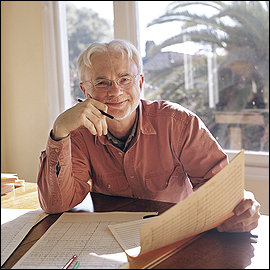Composer John Adams, speaking to Colin Eatock in a special interview for The Globe and Mail
“Coming back to it now,” says Adams, “I’m astonished by what I was able to do at the time, given my lack of experience in the world of opera. I hardly ever went to opera, and I’d never written a piece for solo voice. I had no experience in the theatre beyond acting with my mother in South Pacific as a kid, and conducting The Marriage of Figaro with my classmates in college. It was kind of a miracle that my first attempt turned out to have a lasting life.”
Adams is the most respected opera composer in the United States today, and not a year goes by without a company somewhere presenting one of his four operas: Nixon in China, The Death of Klinghoffer, Dr. Atomic or A Flowering Tree. Currently, Nixon in China is in production in two cities: It launched at New York’s Metropolitan Opera on Wednesday, and on Saturday the Canadian Opera Company opens it in Toronto.


At 63, composer John Adams still has boyish features, although his trademark white stubble marks him as a man who’s been around the block. Sitting in a New York café, just across the street from Lincoln Center, his mood is upbeat. He seems happy and self-confident.
As well he should. Adams is the most respected opera composer in the United States today, and not a year goes by without a company somewhere presenting one of his four operas: Nixon in China, The Death of Klinghoffer, Dr. Atomic or A Flowering Tree. Currently, Nixon in China is in production in two cities: It launched at New York’s Metropolitan Opera on Wednesday, and on Saturday the Canadian Opera Company opens it in Toronto.
Has that ever happened before? “I don’t know,” he muses. “It’s possible there was once a performance in the USA and in Europe at the same time. But I don’t keep track of those things. I have no idea how often it’s been done, at this point. I don’t want to sound boastful, but compared to most contemporary operas, it’s had a healthy shelf life.”
In 1987, when Adams’s arrestingly titled first opera opened in Houston, he’d already made a name as a composer of orchestral music. Orchestral works form a major portion of his oeuvre, and he’s enjoyed as much success in the concert hall as he has in the opera theatre. (On March 5, he’ll conduct the Toronto Symphony Orchestra in his City Noir.)
But Nixon in China brought an onslaught of media attention. Critics struggled to analyze the opera, which deals with Richard Nixon’s three-day trip to China in 1972, from a political perspective. Was Adams trying to rehabilitate the former president or do his tarnished reputation further damage? Even the Chinese government got in on the act, with a terse official statement that declared the work “distorted and exaggerated.” But a review in Newsday magazine hit the nail on the head. “For once, all the funding sources have struck it rich – they’ve got a real opera on their hands.”
Indeed, Adams’s “real opera” – with its brash, confident, minimalist score – blew through the opera world like a blast of fresh air that’s still going strong. Most contemporary operas sink into oblivion after one or two productions, but in addition to its two current productions, 34 other opera companies around the world have staged Nixon since its premiere 24 years ago.
“Coming back to it now,” says Adams, “I’m astonished by what I was able to do at the time, given my lack of experience in the world of opera. I hardly ever went to opera, and I’d never written a piece for solo voice. I had no experience in the theatre beyond acting with my mother in South Pacific as a kid, and conducting The Marriage of Figaro with my classmates in college. It was kind of a miracle that my first attempt turned out to have a lasting life.”
Adams credits the American theatrical director Peter Sellars with first suggesting the theme of Nixon’s trip to China as a suitable topic. “It was about 10 years after Watergate, and Nixon was still not very high in public esteem. In fact, he was struggling to regain his stature as an elder statesman. But I thought about it, and I realized that the story was wonderful: Those three days in Beijing were a kind of constellation of all kinds of things – philosophically, economically, historically – and the characters just screamed for operatic treatment.”
As for the ongoing popularity of Nixon, Adams has a few theories. “Aside from the music – which I can’t comment on without sounding self-congratulatory – I think that Alice Goodman wrote a great libretto. And I also think that the subject matter is intensely meaningful, not just to Americans, but to the world at large: the social welfare state vs. the market economy, the archetype of President Nixon vs. Mao the dictator. And then there’s the role of the women: Pat Nixon, who was the ideal stand-by-your-man Republican housewife; and Madame Mao, who eventually engineered herself into power. This kind of direct appeal isn’t just the case with Nixon in China, but with all of my three operas dealing with contemporary subjects.”
The other two operas Adams is talking about are The Death of Klinghoffer – dealing with the hijacking of the Achille Lauro cruise ship by Palestinian terrorists in 1985 – and Dr. Atomic, about the testing of the first atomic bomb in 1945. Along with Nixon, they’ve been dubbed “CNN operas” for their political bent – a phrase that Adams despises: “I know that journalists love to use that term, but I just loathe it – it’s totally insulting.”
Dr. Atomic was premiered six years ago by the San Francisco Opera, and has since been staged in New York, Chicago and Amsterdam. Its future in the repertoire seems secure.
But The Death of Klinghoffer is a different matter. From its first performance, in Brussels in 1991, it’s been dogged with charges of anti-Semitism. The Klinghoffer of the title is Leon Klinghoffer, a 69-year-old Jewish American who was shot and thrown overboard by the terrorists during the hijacking. “We are outraged at the exploitation of our parents,” his daughters Lisa and Ilsa Klinghoffer said, calling the opera “historically naive and appalling.”
The Los Angeles Opera cancelled a planned production, as did England’s Glyndebourne Opera. And the controversy took on new life after 9/11: The Boston Symphony Orchestra quickly cancelled a scheduled performance of choruses from the opera.
Klinghoffer may have even put Adams on Homeland Security’s radar. “For six or seven years I was on a watch list,” he says, “and I had lots of minor grievances when I was travelling. They wouldn’t tell me why – whether they had Googled ‘opera and terrorism’ and I came up, or whether it was just a misunderstanding because I have a common name. I finally had to go to my senator to get my name off the list.”
He continues: “Funders are gun-shy of Klinghoffer. They’re always afraid that there’s going to be some kind of protest. But I think that audiences respond to it very profoundly. Some people are deeply disturbed by it – but it occupies their attention in the same way that Nixon in China does, and Dr. Atomic does.”
Adams seems unconcerned about what the people portrayed in his operas think of them. To the best of his knowledge, none of the real-life figures in Nixon ever saw the opera. “I knew that those people wouldn’t come to see it,” he remarks, “and I had no particular desire to have their reaction.” (Currently, the sole surviving person portrayed in the opera is Nixon’s then national security adviser Henry Kissinger – and Adams has heard that he’s not planning to attend the Met’s production.)
After years in the spotlight of controversy, Adams knows that it can be a double-edged sword. So it’s not surprising that he’s guarded about his plans to write more works on contemporary subjects. “I have an open invitation from the Met to write a new opera,” he says. “But I haven’t yet found the topic that I feel is worthy of something that grand.”
The Canadian Opera Company performs Nixon in China from Feb. 5 to 26 in Toronto.
Special to The Globe and Mail


